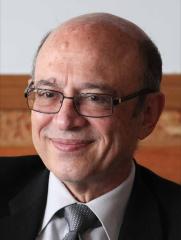Dr. Farzam Arbab
Presentations by Dr. Farzam Arbab
Dr. Arbab notes that the second phase of the Seven Year Plan calls for a significant increase in the number of avowed believers. He reviews the roles of the two principals who will carry out the teaching: 1) The individual Baha’i; and 2) The Baha’i community. He uses the analogy of human cell growth as a model for continued growth and emphasizes the need for classes—especially childrens classes—to increase knowledge and understanding of the Faith and the need to understand human nature.
From the beginning of the recording nearly one hour is taken up introducing new youth believers who declared at this gathering. Next to be introduced were youth pioneers from around the world who were present. Finally those youth were had already made some commitment to pioneer were invited up on stage. A speaker reviewed the message of the House of Justice of October 1983 in which the Office of Social and Economic Development at the World Centre was calling for youth to arise to pioneer in two projects, one in Latin America and another in Africa.
The House of Justice has sent two major messages to the youth in the past sixteen months. Mr. Schechter recommends that parents sit down with their youth and go over these messages and also read the Ridvan messages with them. Dr. Arbab is next and congratulates the parents of Bahá’í youth. He worked with the youth on a project that “Youth Can Move the World”. He consulted with the NSAs of the USA and of Canada about the issue of youth.
Mr. Arbab quotes the Ridvan 1983 message of the House: “The growing maturity of a world-wide religious community which all these processes indicate is further evidenced in the reaching out, by a number of national communities, to the social and economic life of their countries, exemplified by the founding of tutorial schools, the inception of radio stations, the pursuit of rural development programs and the operation of medical and agricultural schemes.
A challenge to Baha'i Scholars
Bahá'í Development
- For those of you who plan to be involved with a Bahá'í
development project, I'd like to offer the following points.
1. The tendency to treat development as products
to be handed out or sold to people should be avoided
2. No Bahá'í development project should be launched without
having in place a mechanism for constant
and continued consultation with those who are to
derive benefits from the development project.

